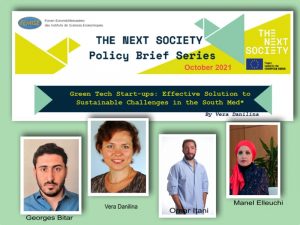 Micro, small and medium enterprises (MSMEs) constitute about 95% of total enterprises in the South Med region and are considered the driving forces of economic growth, job creation and green and inclusive growth. Entrepreneurs, particularity start-ups, still face numerous challenges when it comes to establishing, promoting and running their businesses. Providing them with support through innovative initiatives and enhancing the ecosystem where they operate will contribute to their development. In their turn, entrepreneurs will contribute to achieving several of the Sustainable Development Goals (SDGs).
Micro, small and medium enterprises (MSMEs) constitute about 95% of total enterprises in the South Med region and are considered the driving forces of economic growth, job creation and green and inclusive growth. Entrepreneurs, particularity start-ups, still face numerous challenges when it comes to establishing, promoting and running their businesses. Providing them with support through innovative initiatives and enhancing the ecosystem where they operate will contribute to their development. In their turn, entrepreneurs will contribute to achieving several of the Sustainable Development Goals (SDGs).
It is in this context that the Next Society (TNS) project and FEMISE decided to launch this initiative to produce “The Next Society Policy Briefs Series”. This series of briefs aims to better understand the challenges faced by entrepreneurs (through the lens of the entrepreneurs themselves) and to provide tailor-made operational policy recommendations. These briefs are based on collaborative work and exchange of knowledge and experience between the researcher(s)/author(s) and the entrepreneur(s), many of which have benefited from TNS project, ensuring their relevance and impact.
The fifth TNS/ FEMISE Policy Brief, entitled “Green Tech Start-ups: Effective Solution to Sustainable Challenges in the South Med” by Vera Danilina, Aix-Marseille University, is available here
 Summary:
Summary:
The Southern Mediterranean region faces different environmental problems such as water scarcity, arable land depletion, air pollution, inadequate waste management, loss of biodiversity, declining marine resources, and degradation of coastal ecosystems. Despite the significant impact of these threats on the quality of life of the population, they are still not consistently part of the development strategies. South Med public policies are predominantly focused on salient threats to socio-economic development such as high unemployment (especially youth unemployment), poverty, income inequality, limited intergenerational mobility, food insecurity, political instability, and military and social conflicts. Current situation limits public policy in implementing widespread environmental instruments requiring alternative approaches. Among the latter, promising solution is offered by GreenTech start-ups, ecological initiatives that often take the form of small- and medium or social enterprises. They belong to a bottom-up approach where businesses are implemented as a response to current local needs of the society. Despite the high potential of this approach, it develops relatively slowly facing certain constraints due to limits of public policy.
This brief focuses on the contribution of GreenTech start-ups to sustainable economic development in South Med countries. It provides an overview of the current opportunities for environmental innovations in South Med countries and the corresponding role of public policy. Then it explores the main refraining obstacles highlighting the experience of three start-ups from Lebanon, Jordan, and Tunisia working in the GreenTech field with a focus on waste and water management and apparel industries, main drivers of their growth, and challenges they are facing. Finally, it concludes with some recommendations to improve the existing public policy in order to foster GreenTech start-ups. Among the latter the brief is focused on the creation of an environmentally-friendly ecosystem with legal, financial and educational support.
Watch this video by the author of the Brief and the entrepreneurs who are sharing their experiences, highlighting the challenges and providing recommendations and lessons learnt.
`*This Policy Brief and this Video are produced as part of the series of TNS/FEMISE Policy Briefs on “Entrepreneurship in South Mediterranean Countries” that is undertaken in partnership between FEMISE and ANIMA Investment Network.
![]() *”This policy brief and this Video have been produced with the financial support of the European Union. The contents of these products are the sole responsibility of the authors and entreprenerus and can under no circumstances be regarded as reflecting the position of the European Union.”
*”This policy brief and this Video have been produced with the financial support of the European Union. The contents of these products are the sole responsibility of the authors and entreprenerus and can under no circumstances be regarded as reflecting the position of the European Union.”

